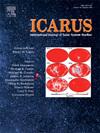Rare earth element assessment in Jezero crater using the Planetary Instrument for X-ray Lithochemistry on the Mars 2020 rover Perseverance: A case study of cerium
IF 2.5
2区 物理与天体物理
Q2 ASTRONOMY & ASTROPHYSICS
引用次数: 0
Abstract
The “Planetary Instrument for X-ray Lithochemistry” (PIXL) X-ray spectrometer conducts in situ geochemical analyses of martian rocks and regolith interrogated by the Mars 2020 rover, Perseverance. In addition to quantifying primary rock-forming elements, PIXL can quantify trace elements that in turn can provide additional constraints on the geologic history of Mars. Accurate quantifications of trace elements can require additional analytical techniques to mitigate experimental, background, and crystalline effects within PIXL spectra. In this study, we focus on reducing the impact of these effects and investigate the potential presence of rare earth elements (REEs). The study specifically investigates cerium given its typical relative abundance in many geologic materials compared to other REEs and its potential to mimic fluorescence features produced by organics under deep UV excitation. A detailed analysis of PIXL targets analyzed through the first 887 martian days of the Perseverance mission did not produce any conclusive Ce detections. Phosphorus-enriched materials analyzed by PIXL are estimated to contain sub-675 ppm Ce and sulfate-enriched materials sub-450 ppm Ce. The method presented can help constrain limits on the abundance of additional trace elements of interest that also face a similar analytical burden. PIXL's potential to assess REE abundances, outside of yttrium, is limited for expected concentrations in surface materials. Determining most REE concentrations in materials interrogated by Perseverance will therefore likely require terrestrial analyses.
利用 "毅力 "号火星探测器上的 X 射线岩石化学行星仪器对杰泽罗陨石坑进行稀土元素评估:铈的案例研究
X 射线岩石化学行星仪器"(PIXL)X 射线光谱仪对火星 2020 年探测器 "毅力号 "探测到的火星岩石和碎屑进行原位地球化学分析。除了对主要成岩元素进行量化外,PIXL 还能对痕量元素进行量化,而痕量元素反过来又能为火星地质历史提供额外的制约因素。痕量元素的精确定量需要额外的分析技术,以减轻 PIXL 光谱中的实验、背景和晶体效应。在本研究中,我们将重点放在减少这些效应的影响上,并调查稀土元素 (REE) 的潜在存在。与其他稀土元素相比,铈在许多地质材料中具有典型的相对丰度,而且在深紫外激发下有可能模仿有机物产生的荧光特征,因此本研究特别对铈进行了调查。在毅力号任务的前 887 个火星日中,对 PIXL 目标进行了详细分析,但没有发现任何确凿的铈探测结果。据估计,PIXL 分析的富磷材料中的 Ce 含量低于 675 ppm,富硫酸盐材料中的 Ce 含量低于 450 ppm。所介绍的方法有助于限制其他相关痕量元素的丰度,这些元素也面临着类似的分析负担。除钇之外,PIXL 评估 REE 丰度的潜力对于地表材料中的预期浓度是有限的。因此,要确定 Perseverance 所研究材料中的大多数 REE 浓度,可能需要进行地面分析。
本文章由计算机程序翻译,如有差异,请以英文原文为准。
求助全文
约1分钟内获得全文
求助全文
来源期刊

Icarus
地学天文-天文与天体物理
CiteScore
6.30
自引率
18.80%
发文量
356
审稿时长
2-4 weeks
期刊介绍:
Icarus is devoted to the publication of original contributions in the field of Solar System studies. Manuscripts reporting the results of new research - observational, experimental, or theoretical - concerning the astronomy, geology, meteorology, physics, chemistry, biology, and other scientific aspects of our Solar System or extrasolar systems are welcome. The journal generally does not publish papers devoted exclusively to the Sun, the Earth, celestial mechanics, meteoritics, or astrophysics. Icarus does not publish papers that provide "improved" versions of Bode''s law, or other numerical relations, without a sound physical basis. Icarus does not publish meeting announcements or general notices. Reviews, historical papers, and manuscripts describing spacecraft instrumentation may be considered, but only with prior approval of the editor. An entire issue of the journal is occasionally devoted to a single subject, usually arising from a conference on the same topic. The language of publication is English. American or British usage is accepted, but not a mixture of these.
 求助内容:
求助内容: 应助结果提醒方式:
应助结果提醒方式:


